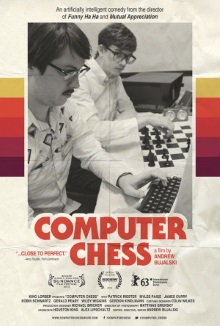
One of my favourite comments about this film is on Broken Forum, when someone mentioned how it’s a film that he’d recommend to almost nobody but he still liked it himself. This unexpectedly turned out to be so very true for my wife and myself. I found myself completely won over by its charm and cleverness but my wife found it irritating and boring.
I guess it helps to actually be a computer nerd and to have some appreciation for the issues involved in writing a chess-playing artificial intelligence. The premise here is that it’s the year 1980 and various groups representing companies, universities and even private individuals gather at a nondescript hotel to submit their chess-playing programs to compete against one another. The winner earns both kudos and cash and gets to play against a human chessmaster who also serves as the master of ceremonies of the event.
The production quality for this film is nothing short of atrocious, and very much deliberately so. This includes poor lighting, bad acting, cheap sets and clumsy dialogue. At first, you’re led to think that this is a mockumentary and the poor quality, roughly analogous to security camera footage, is meant to reflect the fact that the event is being recorded using an era-appopriate hand-held camera. But then the film shows you scenes and angles that should be completely impossible and you realize you’ve been fooled. Look closer and you can see that flashes of brilliance are hidden amidst the wooden acting. Then you realize that although it looks ad hoc and amateurish, everything is actually deliberate and well-planned.
So why do I like it so much? To start with, the portrayal of the chess tournament is pitch perfect in capturing how it’s an eclectic mix of academic heavyweights, industry professionals with plenty of resources and fly-by-night amateurs. Then add in conspiracy theorists and kooks who worry about military infiltration and how this is all a harbinger for the end of humanity. That the event runs in parallel with a New Age style self-help group and the interactions that result is exquisitely delicious.
I found the whole thing to be hilarious. I loved for example how there is only one woman amongst the participants and this fact is repeatedly lauded throughout the event. The entirety of the Michael Papageorge side-plot is of course an elaborate joke, down to how he spends nights begging for rooms and wanders into a room full of cats. Viewers can see what the older couple wants out of the painfully shy Peter Bishton from a mile away, but watching it play out in all its awkwardness is still immensely fun. When the self-aggrandizing chessmaster Pat Henderson blows his cool at the other group at the end of the film, it’s one of most satisfying comeuppances I’ve ever seen.
Then there’s how the film tantalizes you with all sorts of possibilities and directions but never commits to any of them. It’s obvious that the sole woman contestant is attracted to the shy programmer, but does anything come of it? Why indeed does their AI play so badly against other programs? Is the military-industrial complex behind things after all? How did Papageorge ever come up with a chess program? I have to say however that I’m not pleased with the ending, which feels like director Andrew Bujalski jerking around with the audience. Which ending will he pick? None of the above, I bet you didn’t see that coming!
As noted above, it is easy to see that this is not a film for most people, but it speaks for me and I find it an absolute delight. I wouldn’t want every film to “feature” such poor production quality of course but I am very pleased to know that such an odd film can exist.